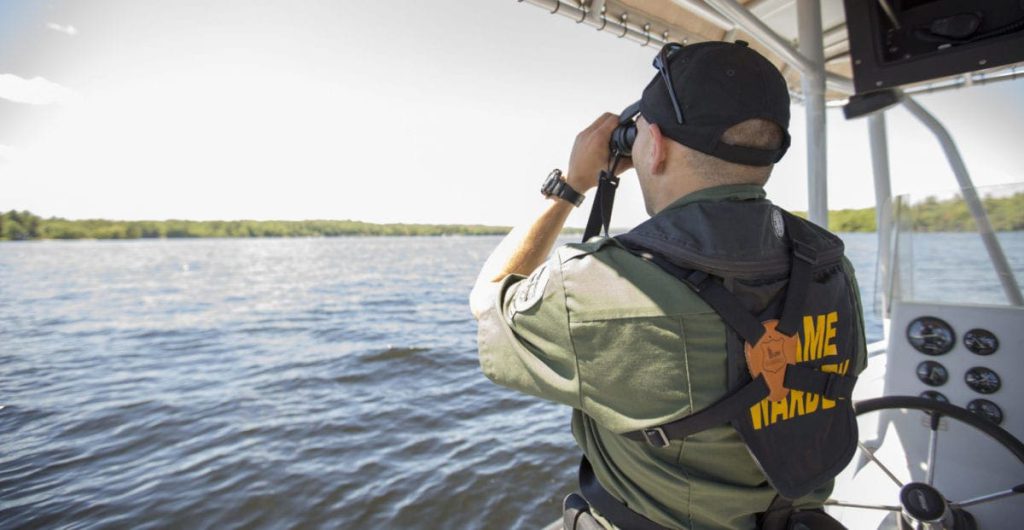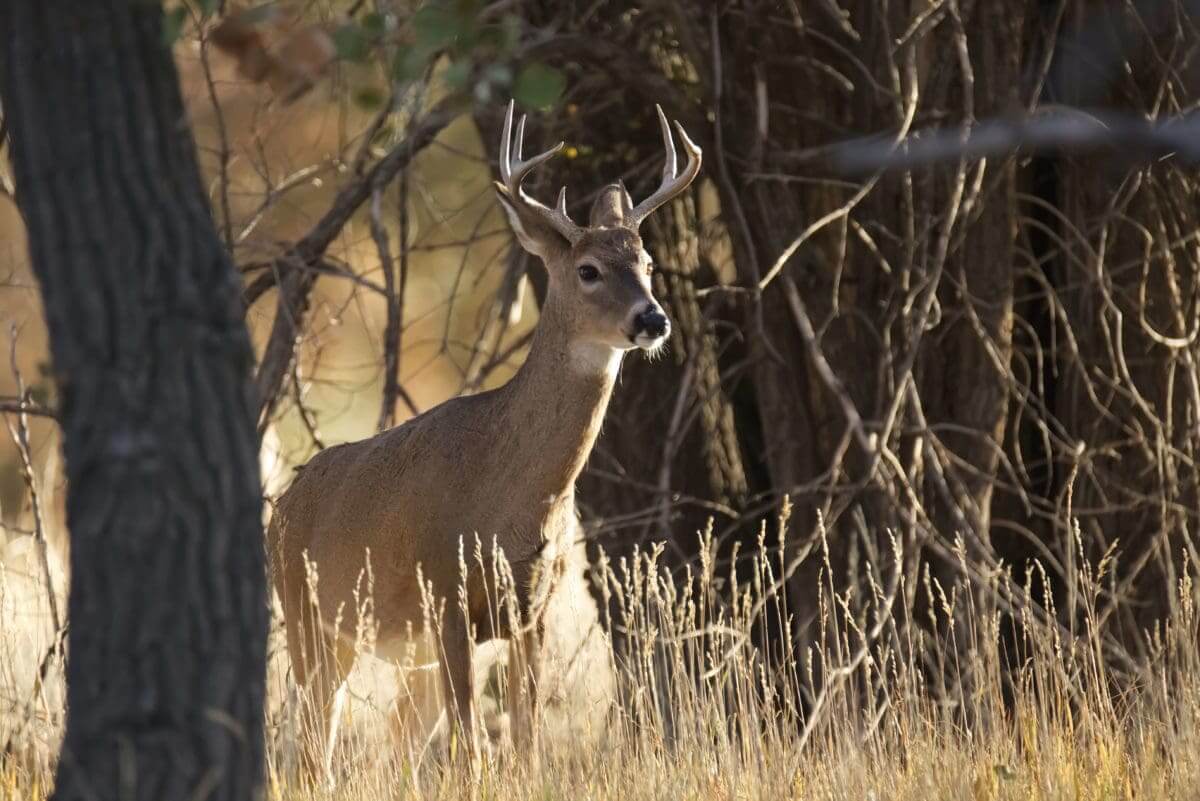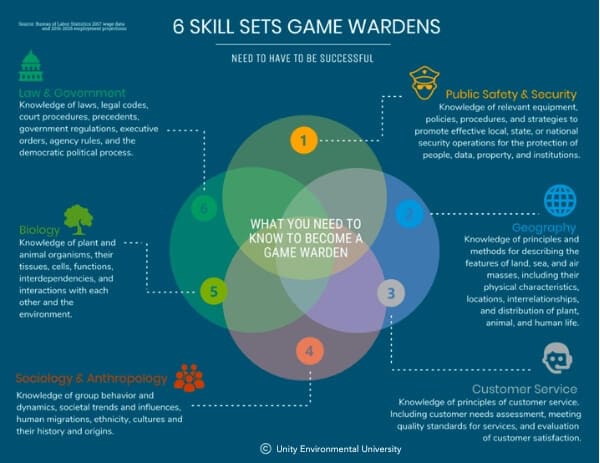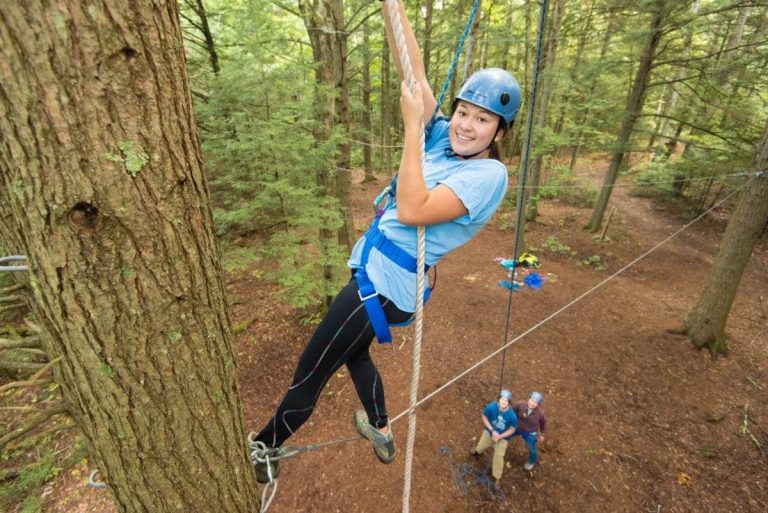

Wondering how to become a game warden? The path to becoming a game warden is challenging but rewarding. Game warden is the perfect profession for adventurous spirits who like to help others and aren’t afraid to step up when they are needed.
Becoming a game warden, or conservation officer as they’re often known, takes hard work and a dedication to human and animal wellbeing. But, there are steps you can take and subjects you can study to gain the knowledge and skills to differentiate yourself from your peers.
Become a game warden to enforce environmental laws to protect the planet.

Some unique requirements to become a game warden include passing a physical fitness test, a mental health screening, and a lie detector test. Our comprehensive career guide outlines all those requirements to help you on your path to becoming a conservation officer. The guide also includes game warden salary and job outlook information to help you decide if being a conservation officer is the right career for you.
|
Career Path Overview for Game Warden |
|
|
Education Requirements |
Associates or Bachelor’s degree |
|
Recommended Degree Program |
|
|
Average Salary (2020) |
$58,190 |
|
Workers Employed in U.S. (2020) |
6,730 |
|
Projected Job Openings by 2030 |
800 per year |
|
Projected Growth Rate |
1% (slower than average) |
|
Other Job Titles |
Conservation Officer, Wildlife Officer, Fish and Game Warden |
|
Related Careers |
|
Source: Bureau of Labor Statistics
What Does a Game Warden Do?
Game wardens protect humans, animals, and natural resources. They educate the public and enforce fishing, hunting, and boating laws. A specific game warden job description depends on the state or office and the level of the position.
Some typical tasks of game wardens include:
- Patrolling assigned areas by car, boat, horse, or on foot
- Issuing and checking hunting, fishing, and boating permits
- Leading wildlife education programs for the public
- Investigating hunting accidents
- Investigating reports of fish or game law violations
- Protecting and preserving native wildlife, plants, and ecosystems
- Issuing warnings or citations and filing reports as necessary
- Providing assistance to other local law enforcement agencies as required
- Participating in search-and-rescue operations
- Investigating and helping to prevent crop or habitat destruction
Conservation officer job titles use military-style rankings such as lieutenant, captain, sergeant, and colonel. Many of these roles are leadership positions. Entry-level game wardens are often referred to as game warden cadets. While entry-level conservation officers may spend most of their days on patrol or doing paperwork, senior-level game wardens may spend their time managing large teams and overseeing the protection of large recreation areas.

Where do Game Wardens Work?
Most conservation officers are employed by state government agencies such as the Maine Warden Service, which employs primarily Unity Environmental University graduates. The biggest employers are Florida, Texas, New York, and Tennessee. Other conservation officers work for local or federal government agencies such as the U.S. Fish and Wildlife Service.
The job of a game warden is partially in an office and partially outdoors. Your time outdoors will likely include monitoring recreation areas to ensure people are being safe. The job may require physical labor and can potentially be dangerous at times, especially if you are handling active criminal activity. Depending on your duties at any given time, you may work alone or with a partner or team.
Requirements to Become Game Wardens in Each State
Game warden requirements vary by state and agency. These include age requirements, education and training requirements, and additional assessments. Since there is so much variation among state-level employers, we recommend discussing the game warden requirements by state with your college or training program teachers and staff.
Most states require background checks and fitness tests to prove you are morally and physically fit to do this job. Because the job can be physically and emotionally demanding at times, many states have minimum and maximum age requirements for their wardens. The age range for federal conservation officers at the time of hire is 21 to 37 years old.
Average Salary of a Game Warden
The average annual salary for conservation officers is $58,190. It’s important to note that this number is a nationwide average that includes workers at all levels of education and experience. Salary can vary significantly based on location and employer as well. The highest paying states for game wardens are New Jersey, California, and Washington.
Game warden salary data from 2021:
- Median: $60,730 per year
- Top 10%: $78,330 per year
- Bottom 10%: $31,200 per year
|
Top 5 States for Game Warden Salary in U.S. |
||
|
State |
Average Annual Salary |
Average Hourly Rate |
|
New Jersey |
$82,400 |
$39.62 |
|
California |
$82,120 |
$39.48 |
|
Washington |
$78,080 |
$37.54 |
|
Illinois |
$76,800 |
$36.92 |
|
Hawaii |
$72,530 |
$34.87 |
Source: Bureau of Labor Statistics
What is the Job Outlook for Game Wardens?
As you might expect, a career as a game warden, conservation officer, or park ranger means you’ll be working in government. The job market for fish and game law enforcement officers is extremely competitive, so be prepared for a challenge until you get your first posting. The number of jobs available is predicted to grow at a rate of about 1% through 2030.
There were 6,730 game warden jobs across the U.S. in 2021, and about 800 new jobs are projected to become available due to growth and retirement each year through 2030. It’s a unique career path in which only the best of the best applicants are hired.

What Education Is Needed to Become a Game Warden?
Exact game warden education requirements vary depending on the position, but the majority of conservation officer jobs require an associate’s or bachelor’s degree. At the minimum, a high school diploma and a strong science background are needed.
If you are still in high school, you may be wondering how long does it take to become a game warden. After you earn your high school diploma, it takes about 3-5 years to complete all the conservation officer education and training requirements.
Most game warden job descriptions mention that they prefer an applicant to have a bachelor’s degree. That takes about four years to earn. Then, you will need to complete up to one year of law enforcement academy training.
Game Warden High School Recommendations
Because this job has stringent requirements and is highly selective, it’s a good idea to start preparing in high school. This includes regular cardio and strength-training workouts to keep your body in good shape. It’s also important that you surround yourself with the right friends in high school. Certain types of criminal records automatically disqualify applicants from becoming game wardens.
In addition to staying on the right track, you can take extra science courses and join clubs like JROTC or a conservation organization to give yourself a leg up in your journey of how to become a game warden.
High school courses and electives to prepare for a career as a game warden:
- Biology
- Environmental Science
- Animal Science
- Criminology
- Psychology
What Degree Do You Need to Be a Game Warden?
There is no specific game warden school. Instead, interested students should pursue an associate’s or bachelor’s degree in a related field. The most common choices are conservation law, environmental science, and criminal justice. All of these degree options will give you a solid knowledge base in order to get hired as a conservation officer. Even a degree in biology can provide the foundation needed for this career.
Some conservation officer positions offer increased pay or promotion opportunities for officers with advanced degrees. If you are interested in serving as a director or other high-level leadership position, consider a master’s degree in environmental studies. Unity Environmental University offers a flexible, online program designed with the working professional in mind.
Game Warden Training Requirements
After you get hired as a game warden cadet, you must complete a game warden training academy. This training is similar to and often merged with police officer training academy. The length of the training ranges from three months to one year, depending on the state or agency. You can expect the training academy to be physically challenging and intensive. When it’s over though, you will be ready to begin your stable career as a conservation officer.
Game warden training includes:
- Firearm use and certification
- Aggressive driving tactics
- Interviewing strategies
- How to operate a boat
- Wildlife and fish identification practice
Some training programs also prepare game wardens for specialized teams such as a Search and Rescue Team, Honor Guard, or a K-9 team. The types of specialized training offered depend on the needs of an area.
Recommended Unity Degrees and Courses
- B.S. in Conservation Law: The bachelor’s degree in conservation law enforcement at Unity Environmental University focuses on a mixture of natural science and law enforcement. It blends together coursework from its environmental citizen curriculum as well as courses on crime scene investigation, surveillance, evidence handling, and interview/interrogation techniques.
- B.S. in Environmental Studies: A degree in environmental studies gives you a lot of prosperous career options from game warden to environmental scientist. If you are still unsure whether law enforcement is right for you, consider a degree in environmental studies, which includes courses on environmental law.
- B.S. in Wildlife Conservation: A bachelor’s degree in wildlife conservation is ideal for animal and nature lovers. Wildlife management is a big part of a game warden’s job. This program includes fieldwork and job placement assistance. It’s a great stepping stone to a career as a game warden, wildlife biologist, or park ranger.

“I have always wanted to be a Maine Game Warden and would not have progressed so quickly without going to Unity. I have been able to start my career ahead of schedule.”
Emerson Duplissie-Cyr, Maine Game Warden & Unity Environmental University Alumni
Explore More Career Paths Related to Game Warden
Wildlife Conservationist
If you are passionate about protecting wildlife and interested in research, wildlife conservationist may be a great career for you. Wildlife conservationists conduct fieldwork and lab research to help understand and reduce the impact that humans have on wildlife. This is a public service-oriented conservation job without the law enforcement aspect.
Park Ranger
Park rangers work for national, state, and county parks all over the country. Other park rangers work for the National Forest Service or the Bureau of Land Management. Like game wardens, park rangers are law enforcement officers. They enforce laws in parks and forests to protect natural environments and ensure that humans are enjoying the outdoors safely.



